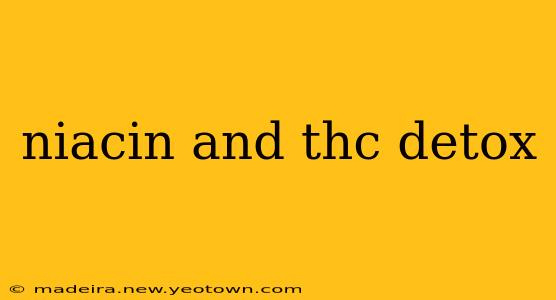The internet is awash with claims about various substances aiding in THC detoxification. One such claim revolves around niacin, also known as vitamin B3. But does this essential vitamin truly play a role in helping your body rid itself of THC? Let's unravel the truth behind this popular yet often misleading claim. This isn't a simple yes or no answer, and understanding the complexities is key.
My name is Alex, and I've spent years researching detoxification methods and the science behind them. I'm not a medical professional, and this information shouldn't be taken as medical advice. Always consult a doctor before making any significant changes to your diet or health regimen.
Does Niacin Help with THC Detox?
The short answer is: not directly. While niacin plays a crucial role in various metabolic processes within the body, there's no scientific evidence to support the claim that it directly accelerates THC elimination. Many websites promoting niacin for THC detox often misrepresent the science, leading to unrealistic expectations.
Niacin's involvement in metabolism doesn't translate to a direct impact on THC. THC is metabolized primarily by the liver via the cytochrome P450 enzyme system. While niacin is involved in many metabolic pathways, it doesn't directly influence the enzymes responsible for THC breakdown.
How Does THC Leave Your System?
Understanding how THC is eliminated is crucial to debunking the niacin myth. THC and its metabolites are primarily eliminated through:
- Urine: This is the primary route of excretion.
- Feces: A smaller amount is eliminated through the digestive system.
- Sweat: Trace amounts can be eliminated through sweat.
The rate at which THC is eliminated depends on various factors, including:
- Frequency of use: Regular users will naturally take longer to detoxify.
- Metabolism: Individual metabolic rates influence how quickly the body processes THC.
- Body fat: THC can be stored in fat tissue, prolonging its detection.
Can Niacin Benefit Detox in Other Ways?
While niacin doesn't directly affect THC elimination, it plays a vital role in overall health. A healthy liver is essential for efficient detoxification processes. A balanced diet rich in vitamins, including niacin, can contribute to overall liver health. However, this is a general health benefit, not a direct effect on THC clearance.
What About Other Detox Methods?
Many individuals seek faster THC detoxification methods. It's crucial to approach these claims with skepticism. While certain strategies might aid in speeding up the process to some extent, there's no magic bullet. Common methods include:
- Hydration: Drinking plenty of water helps flush out toxins.
- Exercise: Increased physical activity can aid in metabolism.
- Healthy diet: A balanced diet supports overall bodily functions.
FAQs: Addressing Common Concerns
How long does it take for THC to leave your system?
This highly depends on the factors mentioned above, making it impossible to give a definitive timeframe. Tests can detect THC metabolites for days, weeks, or even months, depending on the individual and their usage patterns.
Can I speed up THC detoxification?
While you can support your body's natural detoxification process through a healthy lifestyle, you cannot significantly "speed up" the elimination of THC. Any claims suggesting otherwise are likely misleading.
Is niacin dangerous in high doses?
Yes, consuming excessive amounts of niacin can lead to adverse effects such as flushing, liver damage, and other health problems. Always follow recommended daily intake guidelines.
In conclusion, while niacin is essential for overall health and indirectly supports liver function, it doesn't directly impact THC detoxification. Focus on a healthy lifestyle for general well-being, but understand that there's no shortcut to removing THC from your system. Always consult with a medical professional for personalized advice on health and detoxification.

